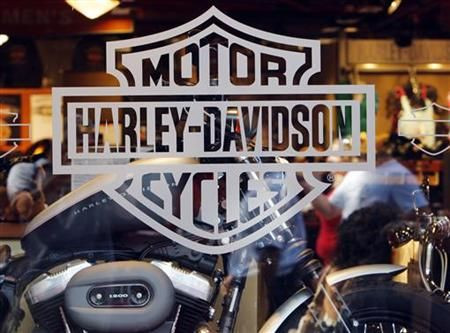Harley-Davidson To Propel Its Battery-Powered Motorcycle Into The Mainstream

Motorcycle giant Harley-Davidson Motor Co. (NYSE:HOG) is propelling battery-powered motorcycles into the mainstream.
The 111-year-old manufacturer is slated to unveil its first electric motorcycle next week in New York, marking its initial step into a niche vehicle market that until now has included only a handful of small startups.
“We think that the trends in both [electric-vehicle] technology and customer openness to EV products, both automotive and motorcycles, is only going to increase,” Matthew Levatich, the company’s president, told Associated Press this week. “When you think about sustainability and environmental trends, we just see that being an increasing part of the lifestyle and the requirements of riders.”
Its emissions-free LiveWire motorcycle won’t have the familiar roar of its gas-powered models. Instead, it will sound like a fighter jet coming in for a landing, an executive told Bloomberg News. The model will undergo extensive research and development in the next several years before it hits the market.
The big brand’s move into electric motorcycles “is going to do a lot for this nascent market,” Cosmin Laslau, a research analyst in energy-storage technologies at Lux Research in Boston, told International Business Times. “When somebody has the manufacturing heft behind them to put out high-quality products that are backed by a really strong engineering department … then it opens up a host of opportunities.”
Still, Laslau said he doesn’t think electric motorcycles will be flying off the showroom floor any time soon, for two key reasons: expensive battery packs that drive up sticker prices, and consumers’ range anxiety—the fear that they’ll find themselves stranded on the road with a dead battery and no place to charge. Both hurdles plague the four-wheel electric-vehicle market, which so far make up just 1 percent of annual vehicle sales worldwide.
Harley said its electric motorcycle battery will go about 130 miles on a single charge. Laslau said the maker could attract more buyers by doubling the range. Smaller, more energy-dense battery packs could also help drive down the price premium of electric bikes. That’s “the biggest thing that could drive this market,” he said.
Only about 5,000 full-size, high-powered electric motorcycles are expected to sell globally this year, and half will come from one firm alone: the Silicon Valley startup Zero Motorcycles. By comparison, Harley-Davidson sold more than 260,000 conventional motorcycles in 2013, AP noted.
Other electric motorcycle makers include startups like Brammo, Mission Motor and Lightning, though Japan’s Yamaha Motor has an electric model in development, and Germany’s BMW is said to have an electric scooter in production, according to the Los Angeles Times.
Harley’s Levatich said the company will address the range-anxiety challenge by helping to develop rapid-charging technologies and creating universal industry standards, so that all makes and models can use the same plugs, AP said. He added that Harley could also provide charging stations through its dealership network.
Laslau suggested that Harley might take a page from the electric automobile experience: While demand from mass-market consumers might be tepid, luxury-class cars have so far been a hit (think Tesla). “It might be an interesting expansion into new markets where they’re trying to target unconventional [motorcycle] buyers,” he said.
© Copyright IBTimes 2025. All rights reserved.





















